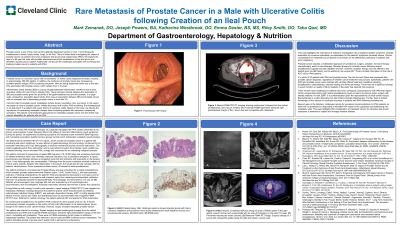Monday Poster Session
Category: IBD
P2714 - Rare Metastasis of Prostate Cancer in a Male With Ulcerative Colitis Following Creation of an Ileal Pouch
Monday, October 28, 2024
10:30 AM - 4:00 PM ET
Location: Exhibit Hall E

Has Audio

Mark Zemanek, DO
Cleveland Clinic Foundation
Cleveland, OH
Presenting Author(s)
Mark Zemanek, DO1, Joseph Carter Powers, BA2, Katherine E. Westbrook, DO1, Emma F. Dester, MS2, Taha Qazi, MD3
1Cleveland Clinic Foundation, Cleveland, OH; 2Cleveland Clinic Lerner College of Medicine, Cleveland, OH; 3Cleveland Clinic Foundation, Beachwood, OH
Introduction: An estimated 1.6 million cases of prostate cancer are diagnosed annually. Common metastatic sites include bones, lymph nodes, liver, and lungs. In this report, we present a case of prostate cancer, initially discovered with routine prostate specific antigen (PSA) monitoring, that metastasized to an ileal pouch-anal anastomosis (IPAA) in a patient with ulcerative colitis (UC).
Case Description/Methods: A 68-year-old male with a history of medically refractory UC treated with IPAA presented with increased bowel movement (BM) frequency despite a grossly normal pouch endoscopic evaluation (pouchoscopy). At this time, the patient was also found to have an elevated PSA. Given concern for prostate cancer in a patient with worsening ileal pouch symptoms, he was referred to gastroenterology (GI) and urology. The patient was then scheduled for a prostatectomy which revealed prostatic adenocarcinoma.
Despite the prostatectomy, the patient experienced gradual worsening of pouch symptoms. He had minimal relief despite treatment with antibiotics, diet changes, pelvic floor retraining, and GI psychology evaluation.
At follow-up with urology 3 months post-operation, repeat imaging (PSMA PET/CT) was negative for metastasis. The patient was referred to medical oncology and ultimately declined androgen deprivation therapy (ADT) and elected for PSA observation. At six months post-prostatectomy, the patient’s PSA continued to increase. Repeat pouchoscopy showed congestion in the rectal cuff and mild inflammation. Pouch biopsy revealed metastatic prostate cancer with malignant cells that were PSMA and NKXS.1 positive.
Given this biopsy, oncology recommended repeat imaging which showed metastasis in the pouch (Figure 1). The patient ultimately elected to pursue pouch explant.
Discussion: Despite thorough evaluation by numerous specialists, an explanation and treatment plan for the patient’s increased BM frequency and discomfort remained elusive. Clinical consideration for metastatic pouch disease must remain on the differential, particularly in patients with prior malignancy.
Once diagnosed, prostate cancer treatment presents another hurdle by requiring a multifaceted approach of surveillance, surgery, radiation, hormone therapy, chemotherapy, and/or immunotherapy. Overall, there remains extremely limited information on how to navigate treatment and monitoring in IPAA patients specifically.

Disclosures:
Mark Zemanek, DO1, Joseph Carter Powers, BA2, Katherine E. Westbrook, DO1, Emma F. Dester, MS2, Taha Qazi, MD3. P2714 - Rare Metastasis of Prostate Cancer in a Male With Ulcerative Colitis Following Creation of an Ileal Pouch, ACG 2024 Annual Scientific Meeting Abstracts. Philadelphia, PA: American College of Gastroenterology.
1Cleveland Clinic Foundation, Cleveland, OH; 2Cleveland Clinic Lerner College of Medicine, Cleveland, OH; 3Cleveland Clinic Foundation, Beachwood, OH
Introduction: An estimated 1.6 million cases of prostate cancer are diagnosed annually. Common metastatic sites include bones, lymph nodes, liver, and lungs. In this report, we present a case of prostate cancer, initially discovered with routine prostate specific antigen (PSA) monitoring, that metastasized to an ileal pouch-anal anastomosis (IPAA) in a patient with ulcerative colitis (UC).
Case Description/Methods: A 68-year-old male with a history of medically refractory UC treated with IPAA presented with increased bowel movement (BM) frequency despite a grossly normal pouch endoscopic evaluation (pouchoscopy). At this time, the patient was also found to have an elevated PSA. Given concern for prostate cancer in a patient with worsening ileal pouch symptoms, he was referred to gastroenterology (GI) and urology. The patient was then scheduled for a prostatectomy which revealed prostatic adenocarcinoma.
Despite the prostatectomy, the patient experienced gradual worsening of pouch symptoms. He had minimal relief despite treatment with antibiotics, diet changes, pelvic floor retraining, and GI psychology evaluation.
At follow-up with urology 3 months post-operation, repeat imaging (PSMA PET/CT) was negative for metastasis. The patient was referred to medical oncology and ultimately declined androgen deprivation therapy (ADT) and elected for PSA observation. At six months post-prostatectomy, the patient’s PSA continued to increase. Repeat pouchoscopy showed congestion in the rectal cuff and mild inflammation. Pouch biopsy revealed metastatic prostate cancer with malignant cells that were PSMA and NKXS.1 positive.
Given this biopsy, oncology recommended repeat imaging which showed metastasis in the pouch (Figure 1). The patient ultimately elected to pursue pouch explant.
Discussion: Despite thorough evaluation by numerous specialists, an explanation and treatment plan for the patient’s increased BM frequency and discomfort remained elusive. Clinical consideration for metastatic pouch disease must remain on the differential, particularly in patients with prior malignancy.
Once diagnosed, prostate cancer treatment presents another hurdle by requiring a multifaceted approach of surveillance, surgery, radiation, hormone therapy, chemotherapy, and/or immunotherapy. Overall, there remains extremely limited information on how to navigate treatment and monitoring in IPAA patients specifically.

Figure: Repeat PSMA PET/CT imaging showing postsurgical changes from the radical prostatectomy and J-pouch creation with moderate PSMA expression along the right posterolateral margin of the J pouch that was compatible with metastasis.
Disclosures:
Mark Zemanek indicated no relevant financial relationships.
Joseph Carter Powers: The Crohn's and Colitis Foundation Grant Funding through the Student Research Fellowship Award – Grant/Research Support.
Katherine Westbrook indicated no relevant financial relationships.
Emma Dester indicated no relevant financial relationships.
Taha Qazi: Abbvie Biosciences – Advisor or Review Panel Member, Consultant, Grant/Research Support, Speakers Bureau. Celgene/BMS – Advisor or Review Panel Member, Speakers Bureau. Janssen – Speakers Bureau. Pfizer – Advisor or Review Panel Member, Advisory Committee/Board Member. Prometheus Biosciences – Advisor or Review Panel Member, Advisory Committee/Board Member, Consultant.
Mark Zemanek, DO1, Joseph Carter Powers, BA2, Katherine E. Westbrook, DO1, Emma F. Dester, MS2, Taha Qazi, MD3. P2714 - Rare Metastasis of Prostate Cancer in a Male With Ulcerative Colitis Following Creation of an Ileal Pouch, ACG 2024 Annual Scientific Meeting Abstracts. Philadelphia, PA: American College of Gastroenterology.
